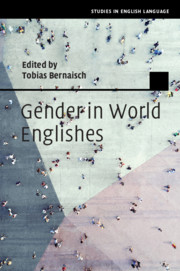Book contents
- Gender in World Englishes
- Studies in English Language
- Gender in World Englishes
- Copyright page
- Dedication
- Contents
- Figures
- Tables
- Contributors
- Chapter 1 Introduction
- Chapter 2 Localisation, Globalisation and Gender in Discourse-Pragmatic Variation in Ghanaian English
- Chapter 3 Sociolinguistic Variation in Intensifier Usage in Indian and British English
- Chapter 4 Tag Questions and Gender in Indian English
- Chapter 5 Hedges and Gender in the Inner and Expanding Circle
- Chapter 6 The Role of Gender in Postcolonial Syntactic Choice-Making
- Chapter 7 Social Constraints on Syntactic Variation
- Chapter 8 Linguistic Colloquialisation, Democratisation and Gender in Asian Englishes
- Chapter 9 Gender, Writing and Editing in South African Englishes
- Index
- References
Chapter 7 - Social Constraints on Syntactic Variation
The Role of Gender in Jamaican English Ditransitive Constructions
Published online by Cambridge University Press: 11 December 2020
- Gender in World Englishes
- Studies in English Language
- Gender in World Englishes
- Copyright page
- Dedication
- Contents
- Figures
- Tables
- Contributors
- Chapter 1 Introduction
- Chapter 2 Localisation, Globalisation and Gender in Discourse-Pragmatic Variation in Ghanaian English
- Chapter 3 Sociolinguistic Variation in Intensifier Usage in Indian and British English
- Chapter 4 Tag Questions and Gender in Indian English
- Chapter 5 Hedges and Gender in the Inner and Expanding Circle
- Chapter 6 The Role of Gender in Postcolonial Syntactic Choice-Making
- Chapter 7 Social Constraints on Syntactic Variation
- Chapter 8 Linguistic Colloquialisation, Democratisation and Gender in Asian Englishes
- Chapter 9 Gender, Writing and Editing in South African Englishes
- Index
- References
Summary
The present study explores the effect of speakers’ gender in the well-known dative alternation (e.g. Mary gives John an apple vs. Mary gives an apple to John) and weighs the impact of this language-external factor against language-internal factors such as length of the constituents or semantics of the verb. Following up on previous research that explored the dative alternation across nine varieties of English, the focus of the present work will be on Jamaican English, a variety where male and female speakers seem to use the two variants differently. 615 variable dative tokens of acrolectal Jamaican English speech were annotated for eleven language-internal and three language-external factors and subjected to conditional random forest and mixed-effects logistic regression analyses. The results of these analyses indicate that the predictor gender plays only a marginal role vis-à-vis other language-external and -internal constraints. At the same time, if only the two most important language-internal predictors are considered, gender turns out to significantly affect dative choice with male speakers preferring the prepositional variant more than female speakers. These results not only highlight the potential of syntactic alternations to serve as sociolinguistic variables but also point to possibly different social dynamics between male and female speakers in Jamaica.
Keywords
Information
- Type
- Chapter
- Information
- Gender in World Englishes , pp. 147 - 175Publisher: Cambridge University PressPrint publication year: 2021
References
Accessibility standard: Unknown
Why this information is here
This section outlines the accessibility features of this content - including support for screen readers, full keyboard navigation and high-contrast display options. This may not be relevant for you.Accessibility Information
- 3
- Cited by
